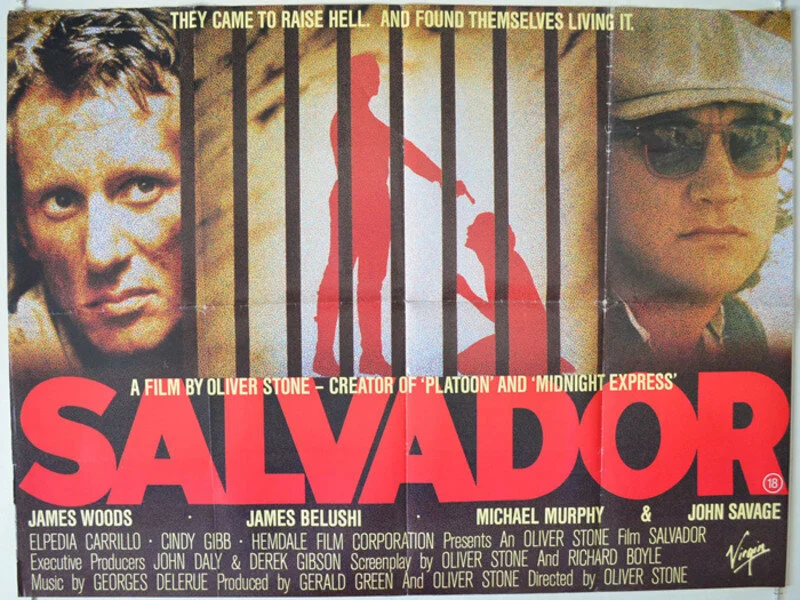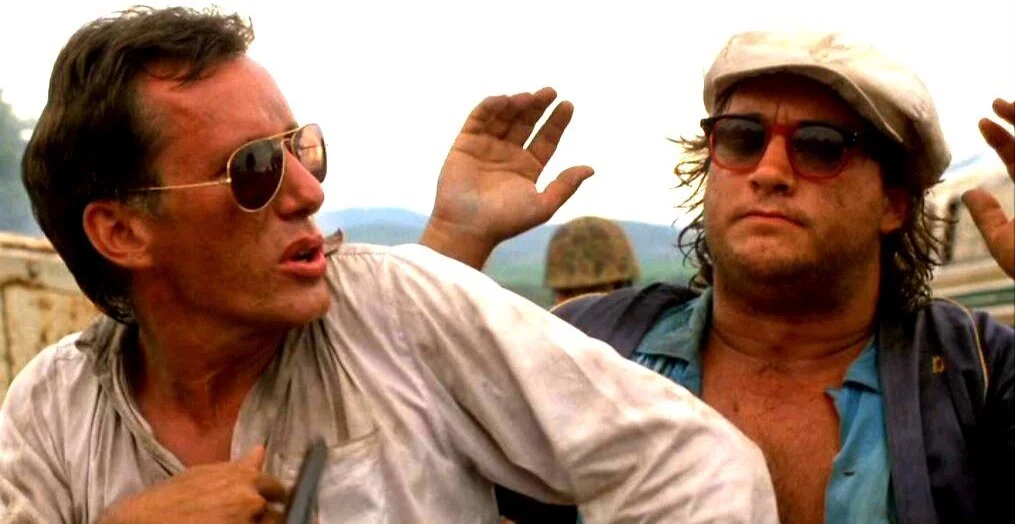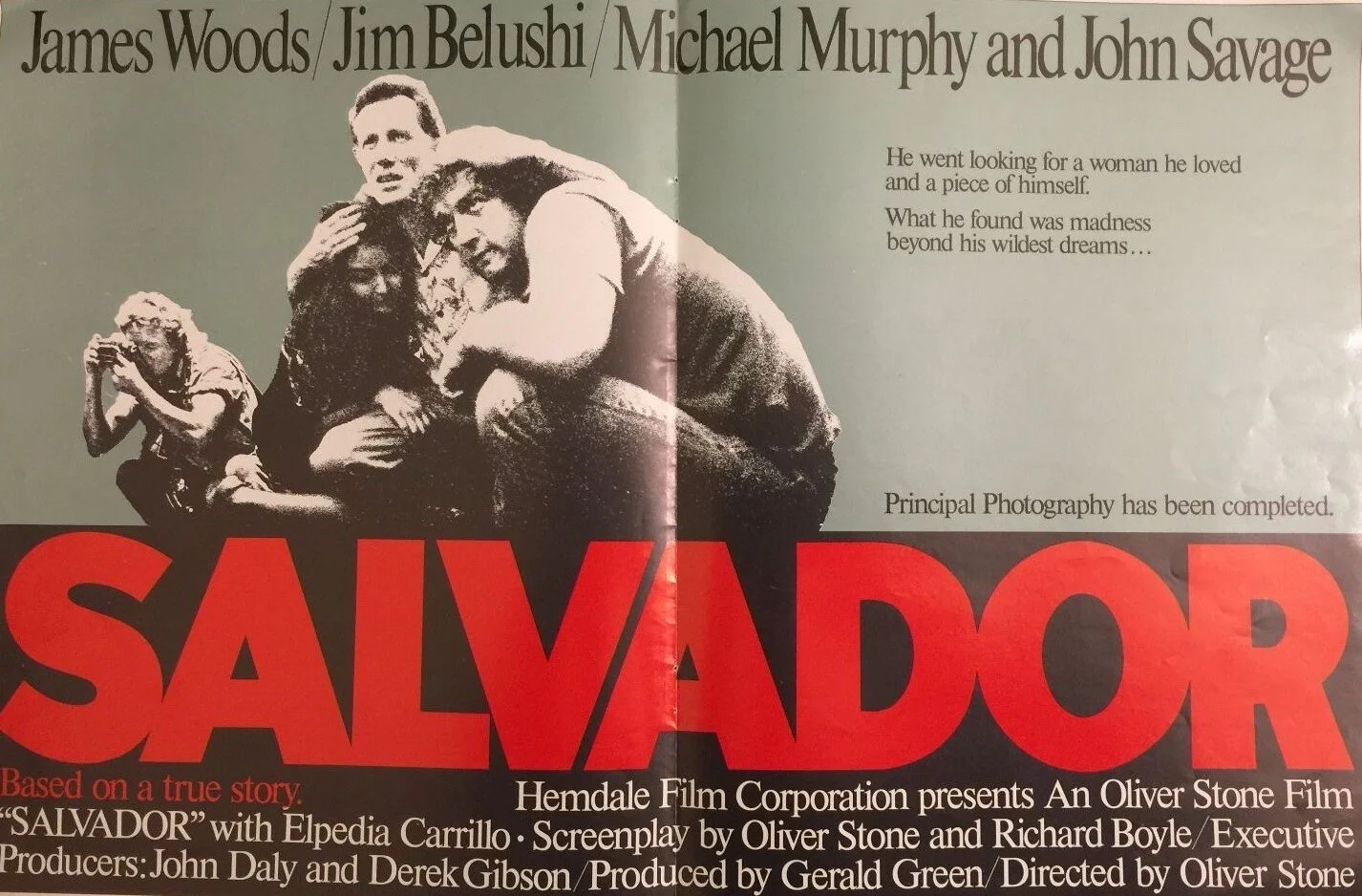Control Nathan Rabin 4.0 #189 Salvador (1986)
They have fun!
Welcome, friends, to the latest entry in Control Nathan Rabin 4.0. It’s the career and site-sustaining column that gives YOU, the kindly, Christ-like, unbelievably sexy Nathan Rabin’s Happy Place patron, an opportunity to choose a movie that I must watch, and then write about, in exchange for a one-time, one hundred dollar pledge to the site’s Patreon account. The price goes down to seventy-five dollars for all subsequent choices.
Or you can be like three kind patrons and use this column to commission a series of pieces about a filmmaker or actor. I’m deep into a project on the films of the late, great, fervently mourned David Bowie and I have now watched and written about every movie Sam Peckinpah made over the course of his tumultuous, wildly melodramatic psychodrama of a life and career.
This generous patron is now paying for me to watch and write about the cult animated show Batman Beyond and I also recently began even more screamingly essential deep dives into the complete filmographies of troubled video vixen Tawny Kitaen and troubled former Noxzema pitch-woman Rebecca Gayheart. I also recently began a series chronicling the films of bad boy auteur Oliver Stone.
1986’s Salvador was released twelve years after Oliver Stone’s obscure 1974 directorial debut Seizure and five years after the release of 1981’s The Hand, Stone’s first directorial effort for a major studio.
Yet in pretty much every way that counts Salvador feels like Stone’s true debut. When we think about an Oliver Stone movie this is what we think about: a violent, profane, socially conscious melodrama plugged directly into the cultural zeitgeist, a vibrant, electric, messy movie with ambition and vision, a movie that matters.
Seizure and The Hand may have been directed by Oliver Stone but Salvador is unmistakably the first real Oliver Stone movie, with all of the good and bad that entails.
Like a true debut, Salvador feels like the movie Stone had been working towards his entire life as a writer, director, propagandist, activist and political thinker, a manifesto that represents his aesthetic and sensibility in its purest form.
Though he began his career with a pair of shockers, Stone was never meant to be a Frightmaster. That’s not where his gifts lie. As a major filmmaker, Stone would deal in controversy and politics rather than nightmares and terror, beginning with a nervy psychodrama positively vibrating with righteous outrage over the United States’ propping up brutal, militaristic regimes in Central America as long as they oppose Communism.
But before Salvador becomes a message movie about a sticky foreign policy entanglement our government would love for the public to forget, or better yet, not know about in the first place, the controversial drama starts out as Fear and Loathing in Central America, with James Woods and funnyman turned pot farmer James Belushi in the Hunter S. Thompson and Dr. Gonzo roles.
Belushi’s wildman rock and roll DJ is even nicknamed Dr. Rock despite a seeming lack of medical credentials and certification. Salvador opens with its joint-puffing, tequila swilling antiheroes bottoming out in the United States.
Tired of too little money and too much uncertainty, the wife of real life journalist Richard Boyle (James Woods) leaves him and takes his infant son with her. Boyle’s buddy Doctor Rock (James Belushi) is similarly out of work so the two men decide to head down south for drunken debauchery and a little sex tourism.
Richard sells Doctor Rock on living the good life in Central America as the promised land by telling him that in this paradise “You can drive drunk. You can get anyone killed there for fifty bucks. Where else can you get a virgin to sit on your face for seven bucks? Seven bucks!?!”
As this spiel attests, our protagonist, who co-wrote the screenplay with Stone, is what can charitably be deemed a sleazy, disgusting, sexist, horny, over-sexed drunken piece of shit. That he’s drunk-driving and sweating tequila while he makes his pitch only adds to the rancid air of moral rot.
Richard is, in other words, a character a guy like James Woods was born to play, and plays with sweaty, desperate conviction because on some level he’s not terribly removed from who Woods is as a human being: someone who is very good at what they do and also a repellent human being.
The libertines think their time south of the border will be one long fuck fest but it does not take long for harsh reality to violently disabuse them of their delusions.
Looks like someone did not care for According to Jim
The ugly Americans pay a steep price for thinking of foreign countries as giant open-air strip clubs where they can procure all of the sex and drugs and booze their naughty hearts desire.
The high begins to wear off once the men come to realize that they are stuck in the middle of a Salvadorian Civil War that pits noble, heroic Marxists again a brutal and insane right-wing government, complete with death squads that rape and murder American missionaries, that the United States supports because it is anti-Communist.
The bloated, perpetually drunk and high Jim Belushi never looked or sounded more like his brother John. Salvador is a heavy dramatic film full of the corpses of the innocent, sexual assault and graphic violence but it’s also a movie that casts the Saturday Night Live funnyman and future star of K-9 as a DJ named Doctor Rock so it’s goofy as well.
That weird bifurcated tone works better than it should. It’s as if Belushi and Woods are in two different movies. Belushi is in a wacky dark comedy about a hard-partying rock and roll kind of guy who embarks on a pleasure trip to get drunk and stoned and laid in order to forget his troubles only to find himself in hell with no way to escape and no way back home.
Woods, meanwhile, is in a gritty drama about a profoundly flawed, broken man who rediscovers his moral compass and seemingly lost idealism when he needs to stand up to an evil regime in order to protect his girlfriend and her children.
There’s a wonderful moment about midway through when the hard-charging journalist anti-hero is in confession for what appears to be the first time in ages and he concedes sheepishly to drinking and sleeping with women who are not his wife, admitting, “I weaseled around a lot in my life.”
It’s both funny and poignant because that’s what guys like Richard do: they weasel around. They lie. They cheat. They cut corners. They play the angles. They bribe. They do whatever needs to be done to survive and to get by. And they try to ignore the empty, hollow feeling in their soul where their conscience should be.
The horror and bloodshed of war gets him to stop weaseling around and take a stand for what’s right. Since this is an Oliver Stone movie it’s very clear from the start who is right and who is wrong. The Leftists are on the side of all that is good and proper and the right wing military is downright Satanic in its evil.
Salvador marked the first of eleven collaborations between Stone and cinematographer Robert Richardson, who won Oscars for JFK, The Aviator and Hugo. From the very beginning it was evident that Richardson was a true master whose work had a vividness and a texture all its own.
Richardson’s images here are so intense and visceral that you can smell the sweat on the characters’ brows and feel the oppressive heat of a Salvadorian summer.
Salvador is widely and rightly considered the first Oliver Stone movie but it’s not as well known as iconic later efforts like Platoon, Wall Street and JFK. That’s okay. Once he became a big time, A-list filmmaker Stone made movies so wildly ambitious and over the top that there was no way they could realize all of their Herculean aspirations but with Salvador Stone just wanted to tell an important but relatively modest and self-contained human story that used one man’s redemption as a prism to explore the horrors of the United States’ foreign policy in Central America and succeeded.
Pre-order The Joy of Trash: Nathan Rabin’s Happy Place’s Definitive Guide to the Very Worst of Everything and get access to original articles AS I write them and plenty more bonus stuff like exclusive cards featuring Felipe Sobreiro’s amazing artwork for the book at https://the-joy-of-trash.backerkit.com/hosted_preorders/cart
Help ensure a future for the Happy Place during an uncertain era AND get sweet merch by pledging to the site’s Patreon account at https://www.patreon.com/nathanrabinshappyplace
Also, BUY the RIDICULOUSLY SELF-INDULGENT, ILL-ADVISED VANITY EDITION of THE WEIRD ACCORDION TO AL, the Happy Place’s first book. This 500 page extended edition features an introduction from Al himself (who I co-wrote 2012’s Weird Al: The Book with), who also copy-edited and fact-checked, as well as over 80 illustrations from Felipe Sobreiro on entries covering every facet of Al’s career, including his complete discography, The Compleat Al, UHF, the 2018 tour that gives the book its subtitle and EVERY episode of The Weird Al Show and Al’s season as the band-leader on Comedy Bang! Bang!
Only 23 dollars signed, tax and shipping included, at the https://www.nathanrabin.com/shop or for more, unsigned, from Amazon here







